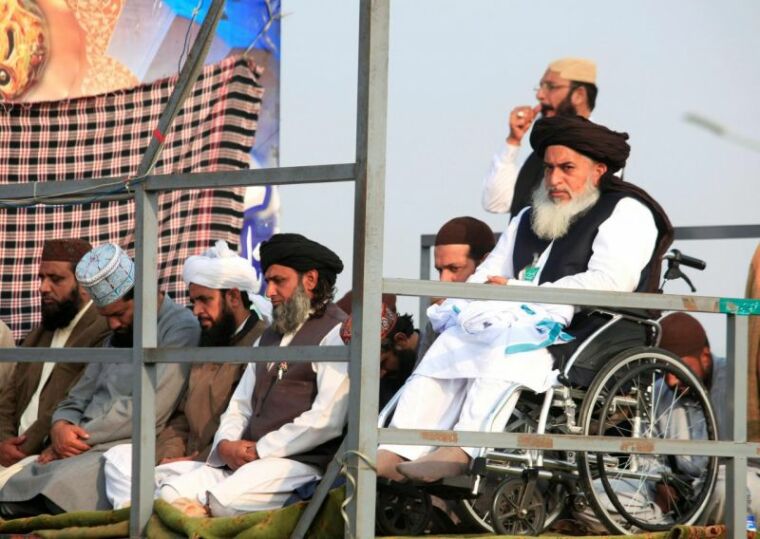Victory of radical political group in Pakistani elections dashes hope for blasphemy law reform

The chances of reforming Pakistan's blasphemy laws were reduced after a newly launched politico-religious group secured a significant amount of votes in a recent by-election.
According to UCA News, the Tehreek-e-Labaik Pakistan (TLP), known for its hardline stance in support of Pakistan's laws against blasphemy, gained more than 10 percent of votes in the recent by-election.
The votes secured by the group were more than that of established political parties such as the Pakistan Peoples Party of slain former Prime Minister Benazir Bhutto.
The TLP grew in popularity following the execution of Mumtaz Qadri, who had assassinated the liberal governor of Punjab, Salman Taseer, after he called for reform to the country's blasphemy laws.
Qadri had been assigned as one of Taseer's bodyguards after he drew outrage for expressing his support for Catholic woman Asia Bibi, who was sentenced to death for blasphemy.
Following Qadri's execution in late February, thousands defied a ban on demonstrations to rally in support of the assassin.
Earlier this month, the Pakistani government was forced to negotiate a six-point agreement after the TLP's religious wing staged a week-long agitation in Islamabad.
UCA News noted that one of the elements of the agreement focused on assurances that Bibi will not be sent abroad despite her blasphemy conviction.
There had been fears that the government's compliance with TLP's demands only provides legitimacy and impunity for the radical group.
TLP supporters had blocked the route into Islamabad for days, demanding that the minister of law be sacked for what they say is blasphemy.
The party had blamed the minister, Zahid Hamid, for making changes to an electoral oath that could have allowed members of the Ahmadiyya Muslim sect to vote without declaring themselves to be Muslims.
The adherents of Ahmadiyya sect are accused of not accepting that Muhammad was God's final prophet and are forbidden from calling themselves as Muslims.
The ruling party in the Parliament had already withdrawn the minor change to the electoral oath and attributed it to a clerical error.
Hamid had promised to create a separate voters' list for Ahmadis as they would not be included in a list reserved for mainstream Muslims. But despite the law minister's assurances, the TLP had refused to end the road blockage in Islamabad.
A government official, Khalid Abbasi, said that protesters on the road were armed with rods and sticks. Pakistani authorities issued a final warning to the protesters on Nov. 17, but since that time, hundreds more party workers had joined the demonstration.
 Christians don't have to affirm transgenderism, but they can’t express that view at work: tribunal
Christians don't have to affirm transgenderism, but they can’t express that view at work: tribunal Archaeology discovery: Medieval Christian prayer beads found on Holy Island
Archaeology discovery: Medieval Christian prayer beads found on Holy Island Presbyterian Church in America votes to leave National Association of Evangelicals
Presbyterian Church in America votes to leave National Association of Evangelicals Over 50 killed in 'vile and satanic' attack at Nigerian church on Pentecost Sunday
Over 50 killed in 'vile and satanic' attack at Nigerian church on Pentecost Sunday Ukrainian Orthodox Church severs ties with Moscow over Patriarch Kirill's support for Putin's war
Ukrainian Orthodox Church severs ties with Moscow over Patriarch Kirill's support for Putin's war Islamic State kills 20 Nigerian Christians as revenge for US airstrike
Islamic State kills 20 Nigerian Christians as revenge for US airstrike Man who served 33 years in prison for murder leads inmates to Christ
Man who served 33 years in prison for murder leads inmates to Christ


 Nigerian student beaten to death, body burned over ‘blasphemous’ WhatsApp message
Nigerian student beaten to death, body burned over ‘blasphemous’ WhatsApp message 'A new low': World reacts after Hong Kong arrests 90-year-old Cardinal Joseph Zen
'A new low': World reacts after Hong Kong arrests 90-year-old Cardinal Joseph Zen Iran sentences Christian man to 10 years in prison for hosting house church worship gathering
Iran sentences Christian man to 10 years in prison for hosting house church worship gathering French Guyana: Pastor shot dead, church set on fire after meeting delegation of Evangelicals
French Guyana: Pastor shot dead, church set on fire after meeting delegation of Evangelicals ‘Talking Jesus’ report finds only 6% of UK adults identify as practicing Christians
‘Talking Jesus’ report finds only 6% of UK adults identify as practicing Christians Mission Eurasia ministry center blown up in Ukraine, hundreds of Bibles destroyed: 'God will provide'
Mission Eurasia ministry center blown up in Ukraine, hundreds of Bibles destroyed: 'God will provide' Church holds service for first time after ISIS desecrated it 8 years ago
Church holds service for first time after ISIS desecrated it 8 years ago Burger King apologizes for 'offensive campaign' using Jesus' words at the Last Supper
Burger King apologizes for 'offensive campaign' using Jesus' words at the Last Supper Uganda: Muslims abduct teacher, burn him inside mosque for praying in Christ’s name
Uganda: Muslims abduct teacher, burn him inside mosque for praying in Christ’s name